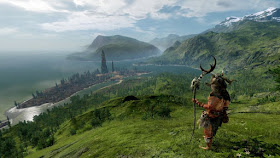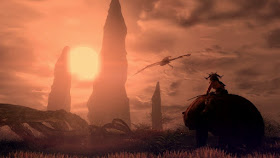Monday, November 9, 2015
Wild: A Game of Animal Survival that Stretches off Into Infinity
If Sony's PlayStation 4 lineup is anything to go by, 2016 will be the year games go to infinity. The headline grabber is No Man's Sky, of course, but for those not keen on space travel, there's another option that's also crazily ambitious. Wild is many things—an adventure game, a survival game, a riding on the back of a bear and skidding his bum along the side of a mountain game—and, like No Man's Sky, it's a game of infinite exploration.
The idea, at least for now, is that players—taking on the role of a shaman—must simply survive. As day turns to night, the world of Wild becomes nasty, and those without shelter or means of protection will succumb to the animals that roam at night. How exactly players will build that protection is something of a mystery for now, although I'm told that climbings up trees is a good place to start. Indeed, much of how Wild will work still seems to be completely up in the air. Every explanation for how the game works is prefaced with the phrase "In the current build..."
But that's not to detract from what is one of the most interesting and exciting games to have come along in years. Survival games aren't all that rare these days—particularly for PC gamers—but one with the scope of Wild is. It's a solo experience, but it's also a multiplayer experience. The animals that roam the world might be AI characters, or they might other players who've channelled their own shaman's spirit into the body of an animal to either help or hinder you on your journey.
You can do the same, of course. As shown in the Paris Games Week stage demo, the shaman can meditate, and take over an eagle's body to swoop down from the sky and capture a snake. Or the shaman can summon a bear, clambering onto its back to traverse the world—complete with an amusing bum-sliding animation—or use its strength to fight enemies. There are no swords or weapons (again, at least in the current build) or anything other than animals that can help you survive.
While Wild will never tell you to go anywhere, or do a particular thing (there isn't even a HUD), its survival systems are geared towards pushing you to interact with animals, and making them your allies. At the start of the game, this is easier said than done. With no allies to start with, you're left hunting smaller animals, or those that are easier to catch, like a frog or a rabbit. And when caught, they must be brought to an oft-guarded divinity stone, where the animal god (a snake in the stage demo) will set a task before you can summon their power.
You may be asked to kill one of your other animal compatriots, or be forced to live as a particular animal for several days, hunting what it hunts, and eating what it eats. And if it's a larger animal like a bear, then it's more complicated than simply capturing it. The bear must be domesticated first, either by raising one from birth—and that means feeding it, walking it, and other parental responsibilities—or by finding an injured bear and nursing it back to health. With each new animal that the shaman learns to control, a new tattoo is etched across the shaman's skin.
If this all sounds a little bit out there, don't worry: it is. Like Dreams—which also got a showing in Paris—Wild defies convention. Perhaps the only thing that's conventional about it for now, is what happens when you die: if you're an animal, you go back to the shaman; if you die as a shaman—something that will happen if you leave him or her out in a vulnerable spot while meditating—you go back to the last camp or shelter that you made or discovered. That there's no permadeath in a console game isn't that surprising, mind.
But I suspect the camps will stick around. If nothing else, needing to discover camps and shelters will encourage exploration, and in a game where "everything" can be explored, keeping people interested is just as important as giving them a vast world to explore. And if you're wondering how a tiny studio like Wild Sheep is making a seemingly infinite game—even with the backing of the legendary Rayman creator Michel Ancel—look no further than procedural generation, or least something very similar.
"The tech means that the game is actually infinite," explained Ancel, "but infinity can be very boring. The world is made up of a lot of different technologies, so you could say that [it's procedurally generated]. I will say that, as a developer, we are helped by the technology to create a game world without spending time creating every single piece of grass, so there is a big system in place helping to create things. It's a balance between homemade things, and generated things. But yes, we use a tool to generate the world in real-time."
I wonder whether—after we've all tried to survive yet another night in Wild, or explore our 10,000th planet in No Man's Sky—infinity will be quite as appealing. Maybe, by the end of 2016, we'll be clamouring for a good ol' fashioned scripted campaign. Or maybe, just maybe, Wild will keep us interested. It has the tech, it has the ideas, and it's just weird enough that it might actually work... "in the current build" at least.
Wild is under development exclusively for PS4. There's currently no release date.



No comments:
Post a Comment